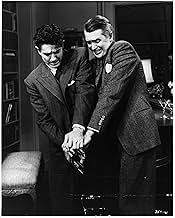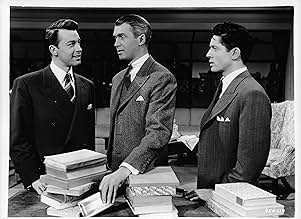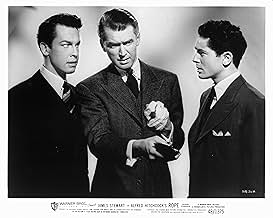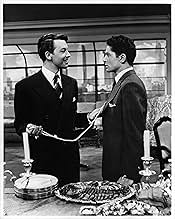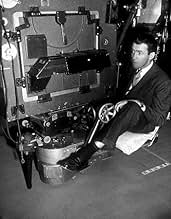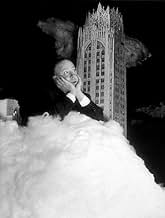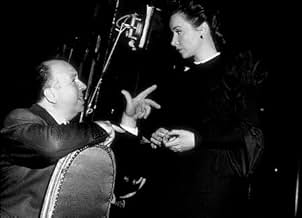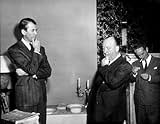Zwei Männer versuchen zu beweisen, dass sie das perfekte Verbrechen begangen haben, indem sie eine Dinnerparty veranstalteten, nachdem sie ihren ehemaligen Klassenkameraden zu Tode gewürgt h... Alles lesenZwei Männer versuchen zu beweisen, dass sie das perfekte Verbrechen begangen haben, indem sie eine Dinnerparty veranstalteten, nachdem sie ihren ehemaligen Klassenkameraden zu Tode gewürgt hatten.Zwei Männer versuchen zu beweisen, dass sie das perfekte Verbrechen begangen haben, indem sie eine Dinnerparty veranstalteten, nachdem sie ihren ehemaligen Klassenkameraden zu Tode gewürgt hatten.
- Auszeichnungen
- 4 Gewinne & 3 Nominierungen insgesamt
Cedric Hardwicke
- Mr. Kentley
- (as Sir Cedric Hardwicke)
Alfred Hitchcock
- Man Walking in Street After Opening Credits
- (Nicht genannt)
Peggy Robertson
- Woman Walking on Sidewalk
- (Nicht genannt)
Empfohlene Bewertungen
Alfred Hitchcock directed so many brilliant movies that the best known ones like 'Rear Window', 'Vertigo', 'Psycho' and 'The Birds' overshadow equally worthy films like 'Shadow Of A Doubt', 'Lifeboat' - insert your personal favourite here - and this one, 'Rope'. It was the first Hitchcock movie to feature James Stewart and it is easily the most underrated of the four movies they made together. I think Stewart was brave for taking this part, which was much darker than the usual characters associated with him, and it's difficult to imagine him being able to play Scottie in 'Vertigo' without having done this movie first. Stewart is excellent in the movie, but equally good are Farley Grainger (who subsequently starred in Hitchcock's 'Strangers On A Train') and John Dall as the thrill killers. Dall gives the best performance in the movie. I'm surprised that after making this and the Noir cult classic 'Gun Crazy' he isn't better known. The technical "gimmick" of 'Rope' is usually mentioned more than anything else about it (Hitchcock wanted one long continuous take, which wasn't possible at the time, but compromised by using several long ones, a very innovative approach at the time), but there is a lot more to it than just that. Considering the strict censorship of the period it was a daring look at homosexuality. The word is never used at any time in the script but a sophisticated audience would have no doubt what was really going on. I've only seen about a third of Hitchcock's output but every movie of his I watch or rewatch makes me marvel at him all the more. The greatest and most influential director of suspense movies was also one of the greatest directors of ANY genre ever. 'Rope' deserves to be mentioned in any list of his ten best movies. 55 years after it was originally released it is as fascinating and entertaining as ever. Highly recommended!
What an unusual Hitchcock film... such a small cast, and the whole film consists of long takes. Before seeing this, I had heard enormously positive things about it... most of them coming from my father, who hadn't seen it for about fifteen years. I had high expectations for the film, but I must say it exceeded them. Though there are only a few cuts in this film, meaning the camera is running almost non-stop, Hitchcock makes great use of it; he manages to fit in many of his trademark angles and closeups in, without it seeming forced. At one point, the camera focuses for a minute and a half on an inanimate object with only one visible character moving back and forth near it, and he manages to drench the cut in suspense, leaving even the most calm and collected of viewers at the edge of their seat, biting their nails. Only the fewest directors could make that sequence work, and luckily Hitchcock is one of them. The plot is great. It's interesting and it develops nicely. The pacing is perfect. I was never bored for a second. The acting, oh the acting... John Dall is excellent as Brandon, the intellectually superior and very smug main character. Makes me wonder why he didn't get more roles in his career. Stewart is great, as usual. The rest of the acting is very good as well. The characters are well-written and credible. For such an unusual film, and despite the heavy feeling of watching a stage play rather than a film, it's very entertaining and effective. If for nothing else, watch this to enjoy Dall as the cold, calculating and manipulative psychopath. I recommend this to fans of Hitchcock and Stewart. 8/10
I generally like "real time", "single take" films (Birdman, Victoria, and the more recent Boiling Point spring to mind), so it was very cool to see what is presumably one of the first attempts at that particular style of filmmaking, executed by the legendary Alfred Hitchcock no less.
A quick bit of research reveals that this movie was in fact shot in 10 takes, ranging from 4 minutes to just over 10 minutes. The transitions between those takes are quite easily spotted, as Hitchcock alternates between having the camera zoom into a dark object, totally blacking out the lens, and making more conventional cuts. This little "deception" (if you could even call it that) to make it seem as if the film consists of one continuous take didn't bother me at all. After all, what is a film but a series of illusions being played on the viewer?
'Rope' is undeniably still the result of a filmmaker who is eager to experiment with the medium and who has confidence in his stylistic prowess. However, when watching films that are considered radically innovative and highly influential, I sometimes find myself appreciating their inventive nature more than really loving them. But with 'Rope', Hitchcock delivers a film that is stylistically inventive while being utterly compelling as well. It's a case of style enhancing substance, as I enjoyed this film for more than just its technical bravura.
About that technical bravura though. The long takes may give this film the feel of a recorded stage play but calling it that would be selling it short. The camerawork is awe-inspiring here, not only in how it navigates the different players and spaces within the single location setting, but also in its framing of certain objects or people in order to manipulate the viewer and generate tension from seemingly ordinary situations.
In addition to the virtuoso long takes, there is also great use of color and lighting in this film. 'Rope' was Hitchcock's first color film, and he seamlessly integrates this added opportunity for visual flair into his trademark style, especially during the suspenseful climactic sequence, where you have those red and green neon lights flickering outside the apartment window. The reflection of these neon lights tinges the proceedings with a hint of surrealism (something Hitchcock would later return in Vertigo). Furthermore, the movie lasts 80 minutes and appears to take place in "real time", but the time frame it is covering is longer. For example, the actual dinner lasts only 20 minutes in the film and the sunset happens way too quickly. Though I am not technically proficient enough to discern exactly how this effect was achieved, I'm pretty sure it involved some inventive way of lighting the scene. The film ultimately concludes with a breathtaking final frame, a remarkable combination of perfect composition and vibrant colors. The exaggeratedly stilted look of that frame adds to the feeling that you're watching the re-enactment of a painting.
To my surprise, I found out that Hitchcock himself later dismissed his experimentation with 10-minute takes in this film as a stunt. Like I mentioned earlier though, I found much more to latch onto in this gripping film than just an appreciation of the innovative filmmaking. All the actors shine in their respective roles, and I thought the 3 central characters had great chemistry. Thematically, it fascinated me how obviously fascist philosophies, like the idea of murder as a privilege of the superior few to do away with inferior beings, are openly discussed only 3 years after World War II had ended. Hitler is even mentioned by name. The blunt way in which the sociopathic Brandon repeatedly talks about the "intellectually superior individuals" and "inferior beings whose lives are unimportant" first struck me as darkly humorous, a satire of how preppy, private-schooled, upper-class brats think of the rest of the world. There is some slick screwball dialogue at other moments that seems to hint at that comedic approach. But the repeated discussions about superiority, followed by that final moralizing monologue by Rupert made me realize that Hitchcock is in fact issuing an explicit warning about the dangers of such philosophies. It is probably exactly because this film came out right after WW II that a genuine fear of fascist ideologies still looms large over 'Rope'.
Unfortunately, that ending is the one thing about this film that didn't work for me. First, it is clearly established that Rupert is the one who has planted his theory about murder being justifiable for a few "superiors" in the boys' head and that Brandon and Phillip put his idea into practice mostly to impress their former headmaster. When we hear them discuss the topic at the party, it first seems as if Rupert is being facetious, but he goes on to explicitly state that he is not kidding. But later still, when he finds out his former pupils have put his theory to the test, Rupert makes a 180-turn, saying that they "twisted his words". He goes on to give a big heavy-handed, moralizing speech that spells out the exact noble principles that we are supposed to take away from the film. I didn't like that sudden shift into didactic moralization and the fact that it comes as the result of such a strange and inconsistent character turn kind of muddied the social commentary for me. I think I would have liked the film better had it indeed been that sharper dark satire I first thought it was intended to be, with Rupert as the half tongue-in-cheek, half serious instiller of fascist ideologies in rich and spoiled upper-class brats. But given the broader context at the time of the film's release, its more explicit approach to that dicey topic is certainly understandable.
Overall, watching 'Rope' was a very enjoyable experience. As a fan of films that use long takes (be it one continuous take or multiple longer ones), it was cool to see the film that undoubtedly influenced many of them. Despite Hitchcock's own dismissal of his visual experiment as a 'stunt', 'Rope' emerges as a daring exploration of style and substance. In addition to the technical mastery, the film boasts excellent performances from its main cast and includes some surprisingly open discussion of fascist ideologies, offering us a glimpse into post-World War II anxieties. The unsatisfying ending, with its inconsistent character turn and heavy-handed moralization, keep the film from being a legit masterpiece in my book, but 'Rope' remains a compelling and largely successful cinematic experiment from a master storyteller unafraid to challenge stylistic and thematic conventions.
A quick bit of research reveals that this movie was in fact shot in 10 takes, ranging from 4 minutes to just over 10 minutes. The transitions between those takes are quite easily spotted, as Hitchcock alternates between having the camera zoom into a dark object, totally blacking out the lens, and making more conventional cuts. This little "deception" (if you could even call it that) to make it seem as if the film consists of one continuous take didn't bother me at all. After all, what is a film but a series of illusions being played on the viewer?
'Rope' is undeniably still the result of a filmmaker who is eager to experiment with the medium and who has confidence in his stylistic prowess. However, when watching films that are considered radically innovative and highly influential, I sometimes find myself appreciating their inventive nature more than really loving them. But with 'Rope', Hitchcock delivers a film that is stylistically inventive while being utterly compelling as well. It's a case of style enhancing substance, as I enjoyed this film for more than just its technical bravura.
About that technical bravura though. The long takes may give this film the feel of a recorded stage play but calling it that would be selling it short. The camerawork is awe-inspiring here, not only in how it navigates the different players and spaces within the single location setting, but also in its framing of certain objects or people in order to manipulate the viewer and generate tension from seemingly ordinary situations.
In addition to the virtuoso long takes, there is also great use of color and lighting in this film. 'Rope' was Hitchcock's first color film, and he seamlessly integrates this added opportunity for visual flair into his trademark style, especially during the suspenseful climactic sequence, where you have those red and green neon lights flickering outside the apartment window. The reflection of these neon lights tinges the proceedings with a hint of surrealism (something Hitchcock would later return in Vertigo). Furthermore, the movie lasts 80 minutes and appears to take place in "real time", but the time frame it is covering is longer. For example, the actual dinner lasts only 20 minutes in the film and the sunset happens way too quickly. Though I am not technically proficient enough to discern exactly how this effect was achieved, I'm pretty sure it involved some inventive way of lighting the scene. The film ultimately concludes with a breathtaking final frame, a remarkable combination of perfect composition and vibrant colors. The exaggeratedly stilted look of that frame adds to the feeling that you're watching the re-enactment of a painting.
To my surprise, I found out that Hitchcock himself later dismissed his experimentation with 10-minute takes in this film as a stunt. Like I mentioned earlier though, I found much more to latch onto in this gripping film than just an appreciation of the innovative filmmaking. All the actors shine in their respective roles, and I thought the 3 central characters had great chemistry. Thematically, it fascinated me how obviously fascist philosophies, like the idea of murder as a privilege of the superior few to do away with inferior beings, are openly discussed only 3 years after World War II had ended. Hitler is even mentioned by name. The blunt way in which the sociopathic Brandon repeatedly talks about the "intellectually superior individuals" and "inferior beings whose lives are unimportant" first struck me as darkly humorous, a satire of how preppy, private-schooled, upper-class brats think of the rest of the world. There is some slick screwball dialogue at other moments that seems to hint at that comedic approach. But the repeated discussions about superiority, followed by that final moralizing monologue by Rupert made me realize that Hitchcock is in fact issuing an explicit warning about the dangers of such philosophies. It is probably exactly because this film came out right after WW II that a genuine fear of fascist ideologies still looms large over 'Rope'.
Unfortunately, that ending is the one thing about this film that didn't work for me. First, it is clearly established that Rupert is the one who has planted his theory about murder being justifiable for a few "superiors" in the boys' head and that Brandon and Phillip put his idea into practice mostly to impress their former headmaster. When we hear them discuss the topic at the party, it first seems as if Rupert is being facetious, but he goes on to explicitly state that he is not kidding. But later still, when he finds out his former pupils have put his theory to the test, Rupert makes a 180-turn, saying that they "twisted his words". He goes on to give a big heavy-handed, moralizing speech that spells out the exact noble principles that we are supposed to take away from the film. I didn't like that sudden shift into didactic moralization and the fact that it comes as the result of such a strange and inconsistent character turn kind of muddied the social commentary for me. I think I would have liked the film better had it indeed been that sharper dark satire I first thought it was intended to be, with Rupert as the half tongue-in-cheek, half serious instiller of fascist ideologies in rich and spoiled upper-class brats. But given the broader context at the time of the film's release, its more explicit approach to that dicey topic is certainly understandable.
Overall, watching 'Rope' was a very enjoyable experience. As a fan of films that use long takes (be it one continuous take or multiple longer ones), it was cool to see the film that undoubtedly influenced many of them. Despite Hitchcock's own dismissal of his visual experiment as a 'stunt', 'Rope' emerges as a daring exploration of style and substance. In addition to the technical mastery, the film boasts excellent performances from its main cast and includes some surprisingly open discussion of fascist ideologies, offering us a glimpse into post-World War II anxieties. The unsatisfying ending, with its inconsistent character turn and heavy-handed moralization, keep the film from being a legit masterpiece in my book, but 'Rope' remains a compelling and largely successful cinematic experiment from a master storyteller unafraid to challenge stylistic and thematic conventions.
This 1948 Hitchcock film is mostly noted for its technical achievements. Hitchcock filmed this story, about two well-to-do rich kids who decide to commit a murder for the fun of it, as a play. Which, it in fact, originally was, though based in London and not New York. Technical limitations did not enable his original vision of making the entire picture one continuous long shot. Instead it is made up of several 8 minute continuous shots. This was the length of film that fit into one reel. Using some very inventive cutting techniques the film appears as if it was filmed all in one take. This is more impressive when you see the actual size that color film cameras were during this time period. They were absolutely enormous, bigger than a man standing. To move the camera in and around the small stage space, many of the set pieces were set on casters and rolled about to keep out of the way of the camera. Some of the actors were noted in saying that they worried every time they sat down, that there might not be a chair for them to fall into. Another achievement of the film is in terms of lighting. The apartment that the entire film is set in has several large windows overlooking the city. As the movie is more or less uninterrupted from start to finish we see the lighting change as the sun begins to set and night falls. It is a testament to this achievement that upon first viewing you don't really notice the effect. Yet, the filmmakers took great pains to get it to look realistic, staging numerous re-shoots for the final few scenes.
Though the technical achievements are quite wonderful, it is a shame that they have overshadowed what it really a very good bit of suspense. It seems the two high society murderers have planned a dinner party just after the murder. They store the corpse in a wood box that is featured prominently in the midst of the dinner. This creates an excellent mix of suspense and the macabre. Throughout the party the murderers become more unraveled even as they are enjoying their little game.
All of the acting is quite good. The two murderer (John Dall and Farley Granger) do a fine job of playing intellectual, society playboys, with a desire for excitement. It is slightly annoying watching their excited, nervous mannerisms (especially some stuttering by Jon Dall) but it is fitting with the characters. Their former instructor, Rupert Cadell, is played magnificently by the impeccable James Stewart. This is a bit of departure from Stewarts typical roles. Here he is a tough, cynical intellectual. This was his first of four collaborations between Stewart and Hitchock and it is hard to imagine his role as Scottie in Vertigo without having first played in this movie.
The story unravels in typical Hitchock fashion. The suspense is built, then lessoned by some well timed comedy, and then built again to a final crescendo. Hitchcock was excellent as a technical director and allowed his actors the breathing room they needed for fine performances. In the end I left the picture feeling more excited about the superb storytelling than any particular technical achievement. It is a testament to his craft, that Hitchock allows you to leave a picture being enamored with his story over his technical achievements. Some of the greatest effects are those you don't notice because they seem so natural and real.
Alfred Hitchock manages a triumph of technical brilliance and suspense in Rope. It's influence in the technical realm of cinema far outshines any effect the story has on future movies. This is a shame, for the story being told is one of suspense, macabre and excitement.
Like this review? Go to www.midnitcafe.blogspot for more.
Though the technical achievements are quite wonderful, it is a shame that they have overshadowed what it really a very good bit of suspense. It seems the two high society murderers have planned a dinner party just after the murder. They store the corpse in a wood box that is featured prominently in the midst of the dinner. This creates an excellent mix of suspense and the macabre. Throughout the party the murderers become more unraveled even as they are enjoying their little game.
All of the acting is quite good. The two murderer (John Dall and Farley Granger) do a fine job of playing intellectual, society playboys, with a desire for excitement. It is slightly annoying watching their excited, nervous mannerisms (especially some stuttering by Jon Dall) but it is fitting with the characters. Their former instructor, Rupert Cadell, is played magnificently by the impeccable James Stewart. This is a bit of departure from Stewarts typical roles. Here he is a tough, cynical intellectual. This was his first of four collaborations between Stewart and Hitchock and it is hard to imagine his role as Scottie in Vertigo without having first played in this movie.
The story unravels in typical Hitchock fashion. The suspense is built, then lessoned by some well timed comedy, and then built again to a final crescendo. Hitchcock was excellent as a technical director and allowed his actors the breathing room they needed for fine performances. In the end I left the picture feeling more excited about the superb storytelling than any particular technical achievement. It is a testament to his craft, that Hitchock allows you to leave a picture being enamored with his story over his technical achievements. Some of the greatest effects are those you don't notice because they seem so natural and real.
Alfred Hitchock manages a triumph of technical brilliance and suspense in Rope. It's influence in the technical realm of cinema far outshines any effect the story has on future movies. This is a shame, for the story being told is one of suspense, macabre and excitement.
Like this review? Go to www.midnitcafe.blogspot for more.
No need to recap the plot.
Leave it to Hitch to venture into uncharted Hollywood territory. First, the movie's a "real time" screenplay that blends 80-mintes of character time into 80-minutes of screen time without a noticeable cut-away. It's the first time, I believe, this was tried. Practically speaking, the movie's almost a filmed stage play. The pitfalls here are many and obvious. Fortunately, the script is generally involving and avoids a chief pitfall by developing the storyline without much drag. At the same time, the characters are a generally colorful lot, especially caterer Wilson (Evanson) and dowager Collier (Atwater). Then too, Hitch's camera heightens developments in unobtrusive fashion, so that we get listener reactions at the same time the speaker is speaking. That way our interest is spread over a number of characters. Second is his use of gay actors (Dall & Granger) to portray scarcely veiled gay characters Brandon & Phillip, respectively. I guess the movie was banned in many locales because of that taboo, (IMDB). Nonetheless, the aspect makes for an interesting subtext, one that Hitch was later to use in Strangers On A Train (1951).
Acting-wise, Dall does well as the intellectual snob, while Granger plays a nervous second fiddle. The Nietzschean theme seems a little shopworn so soon after WWII, but works well enough here as dark motivation. However, I could have done without Rupert's (Stewart) reproofing lecture at movie's end. There should have been a subtler alternative. Plus, his character comes across as something of a stretch. But then convention required someone to put things right, even if Rupert has rather confusingly inspired the Nietzschean-type murder, in the first place
All in all, I can see why many balk at Hitch's experimental result. It is a noticeable departure from the norm. Still, I think the aspects come together well enough to remain an engaging hour-plus, even if not among his best suspense features. At the same time, I can see why the real-time single-set approach never caught on. In lesser hands, it's a time bomb.
Leave it to Hitch to venture into uncharted Hollywood territory. First, the movie's a "real time" screenplay that blends 80-mintes of character time into 80-minutes of screen time without a noticeable cut-away. It's the first time, I believe, this was tried. Practically speaking, the movie's almost a filmed stage play. The pitfalls here are many and obvious. Fortunately, the script is generally involving and avoids a chief pitfall by developing the storyline without much drag. At the same time, the characters are a generally colorful lot, especially caterer Wilson (Evanson) and dowager Collier (Atwater). Then too, Hitch's camera heightens developments in unobtrusive fashion, so that we get listener reactions at the same time the speaker is speaking. That way our interest is spread over a number of characters. Second is his use of gay actors (Dall & Granger) to portray scarcely veiled gay characters Brandon & Phillip, respectively. I guess the movie was banned in many locales because of that taboo, (IMDB). Nonetheless, the aspect makes for an interesting subtext, one that Hitch was later to use in Strangers On A Train (1951).
Acting-wise, Dall does well as the intellectual snob, while Granger plays a nervous second fiddle. The Nietzschean theme seems a little shopworn so soon after WWII, but works well enough here as dark motivation. However, I could have done without Rupert's (Stewart) reproofing lecture at movie's end. There should have been a subtler alternative. Plus, his character comes across as something of a stretch. But then convention required someone to put things right, even if Rupert has rather confusingly inspired the Nietzschean-type murder, in the first place
All in all, I can see why many balk at Hitch's experimental result. It is a noticeable departure from the norm. Still, I think the aspects come together well enough to remain an engaging hour-plus, even if not among his best suspense features. At the same time, I can see why the real-time single-set approach never caught on. In lesser hands, it's a time bomb.
Wusstest du schon
- WissenswertesSince the filming times were so long, everybody on the set tried their best to avoid any mistakes. At one point in the movie, during the first take scene, the camera dolly accidentally ran over and broke a cameraman's foot, but to keep filming, he was gagged and dragged off the soundstage. Another time, a woman puts her glass down but misses the table. A stagehand had to rush up and catch it before the glass hit the ground. Both parts are used in the final cut.
- PatzerWhen Phillip and Brandon put David in the chest, the rope is clearly around David's neck and completely inside the box. But in a few minutes Phillip finds the rope hanging, very far, outside the box.
- Zitate
Mrs. Atwater: Do you know, when I was a girl I used to read quite a bit.
Brandon: We all do strange things in our childhood.
- Crazy CreditsThe closing credits list the victim David Kentley first, and the rest of the cast as credited with a phrase describing their relation to him ("His friends - Brandon, Phillip", "David's girl - Janet", etc) and use only a first/last name.
Rupert Cadell is listed last, and with his full name and without any phrase of relation.
- VerbindungenFeatured in Great Performances: James Stewart: A Wonderful Life (1987)
Top-Auswahl
Melde dich zum Bewerten an und greife auf die Watchlist für personalisierte Empfehlungen zu.
Details
- Erscheinungsdatum
- Herkunftsland
- Sprache
- Auch bekannt als
- La soga
- Drehorte
- Warner Brothers Burbank Studios - 4000 Warner Boulevard, Burbank, Kalifornien, USA(Brandon´s penthouse)
- Produktionsfirmen
- Weitere beteiligte Unternehmen bei IMDbPro anzeigen
Box Office
- Budget
- 1.500.000 $ (geschätzt)
- Weltweiter Bruttoertrag
- 11.580 $
- Laufzeit1 Stunde 20 Minuten
- Farbe
- Seitenverhältnis
- 1.37 : 1
Zu dieser Seite beitragen
Bearbeitung vorschlagen oder fehlenden Inhalt hinzufügen

Oberste Lücke
What is the streaming release date of Cocktail für eine Leiche (1948) in Brazil?
Antwort


